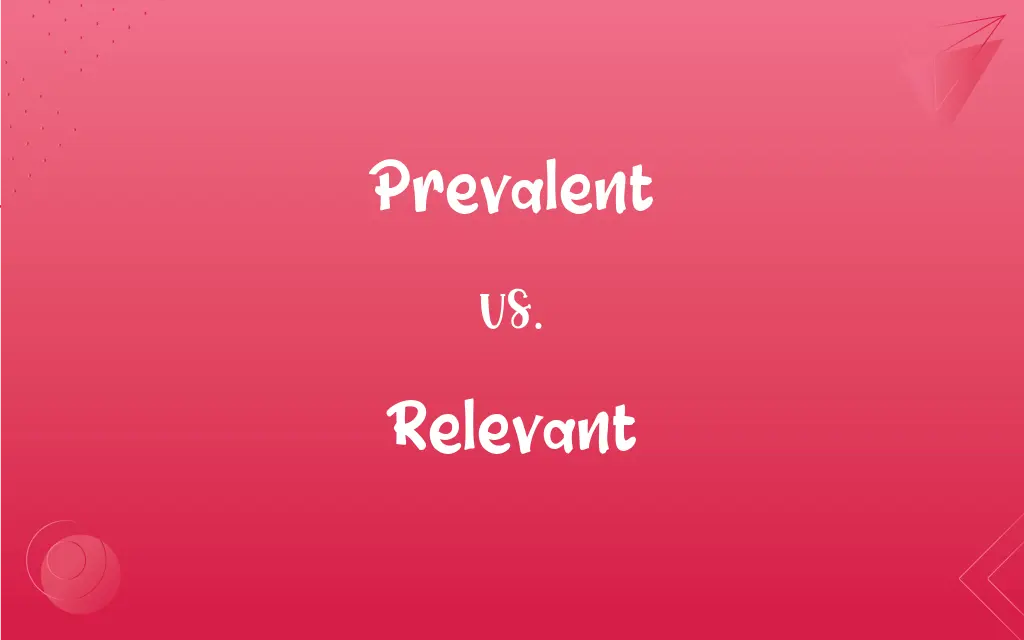Prevalent vs. Relevant: What's the Difference?
Edited by Harlon Moss || By Janet White || Updated on September 29, 2023
"Prevalent" refers to something that is widespread or commonly occurring, while "Relevant" describes something that is closely connected or appropriate to the matter at hand.

Key Differences
"Prevalent" and "Relevant" are two distinct words that are often confused due to their similar-sounding endings. "Prevalent" refers to something that is common or widespread in a particular context. "Relevant," on the other hand, signifies that something is pertinent to the issue at hand.
In practice, "Prevalent" is used to describe phenomena, behaviors, or attitudes that are commonly found in a particular area or among a certain group of people. "Relevant," conversely, can be used to describe any subject, fact, or idea that directly relates to the topic being discussed or debated, and does not imply any level of frequency or commonality like "Prevalent" does.
From a grammatical perspective, both "Prevalent" and "Relevant" are adjectives. While "Prevalent" is more likely to be used with phenomena or conditions, such as in health or social sciences, "Relevant" has a broader range of applicability and can be used in numerous fields including law, business, and everyday conversation.
In summary, while "Prevalent" measures the commonality or widespread nature of something, "Relevant" assesses the appropriateness or connectedness of something to a specific matter or issue. They are used in different contexts and are not interchangeable, despite their phonetic similarities.
Comparison Chart
Definition
Widespread or common
Closely connected
ADVERTISEMENT
Context of Use
Specific areas/groups
Any topic
Grammatical Role
Adjective
Adjective
Subject Matter
Phenomena, conditions
Facts, ideas, subjects
Level of Specificity
General
Specific to the matter
Prevalent and Relevant Definitions
Prevalent
Widely existing or occurring.
Smartphones are prevalent among teenagers.
ADVERTISEMENT
Relevant
Closely connected to the subject at hand.
Your experience is relevant to this job.
Prevalent
Of common or frequent occurrence.
Colds are prevalent during winter.
Relevant
Suitable or appropriate in a given context.
Her comments were relevant to the debate.
Prevalent
Frequently encountered or observed.
High temperatures are prevalent in the desert.
Relevant
Having significant and demonstrable bearing on the matter.
This is relevant information for our project.
Prevalent
Predominant in a particular area.
Soccer is the prevalent sport in Europe.
Relevant
Directly related or logically connected.
Those statistics are relevant to our discussion.
Prevalent
Generally or universally accepted.
It is a prevalent belief that the Earth is round.
Relevant
Having a bearing on or connection with the matter at hand.
Prevalent
Widely or commonly occurring, existing, accepted, or practiced.
Relevant
Meaningful or purposeful in current society or culture
Thought that the traditional male role of breadwinner was no longer relevant.
Prevalent
Widespread or preferred.
Relevant
Related, connected, or pertinent to a topic.
Prevalent
Superior in frequency or dominant.
Relevant
(Usually and especially) Directly related, connected, or pertinent, with important ramifications or implications.
His mother provided some relevant background information concerning his medical condition.
Prevalent
(biology) A species that is prevalent in a certain area.
Relevant
Not out of date; current.
Prevalent
Gaining advantage or superiority; having superior force, influence, or efficacy; prevailing; predominant; successful; victorious.
Brennus told the Roman embassadors, that prevalent arms were as good as any title.
Relevant
Relieving; lending aid or support.
Prevalent
Most generally received or current; most widely adopted or practiced; also, generally or extensively existing; widespread; prevailing; as, a prevalent observance; prevalent disease.
This was the most received and prevalent opinion.
Relevant
Bearing upon, or properly applying to, the case in hand; pertinent; applicable.
Close and relevant arguments have very little hold on the passions.
Prevalent
Encountered generally especially at the present time;
The prevailing opinion was that a trade war could be averted
The most prevalent religion in our area
Speculation concerning the books author was rife
Relevant
Sufficient to support the cause.
Relevant
Having a bearing on or connection with the subject at issue;
The scientist corresponds with colleagues in order to learn about matters relevant to her own research
Relevant
Having crucial relevance;
Crucial to the case
Relevant testimony
Relevant
Applicable or pertinent to a particular matter.
The evidence is relevant to the case.
FAQs
What does Prevalent mean?
"Prevalent" refers to something that is widespread or commonly occurring.
Are both Prevalent and Relevant adjectives?
Yes, both words are adjectives.
Can Prevalent and Relevant be used interchangeably?
No, they refer to different things and are not interchangeable.
Where is Relevant commonly used?
"Relevant" is commonly used in discussions that require an assessment of appropriateness or relatedness.
What does Relevant mean?
"Relevant" describes something that is closely connected or appropriate to the matter at hand.
Is Prevalent about frequency?
Yes, "Prevalent" often refers to how common or frequent something is.
Is Prevalent used in specific contexts?
It often appears in discussions about phenomena or conditions that are widespread.
Is Prevalent always about large numbers?
Not necessarily, but it generally implies a significant extent or degree.
Is Relevant about appropriateness?
Yes, "Relevant" assesses how closely something is related to a particular issue or context.
Are Prevalent and Relevant formal words?
Both are standard English words and can be used in formal and informal settings.
Can Prevalent apply to opinions or beliefs?
Yes, it can describe opinions or beliefs that are widely held.
Is Relevant concerned with timeliness?
It can be, especially if the relevance is tied to a current issue or topic.
Do Prevalent and Relevant have noun forms?
Yes, "Prevalence" and "Relevance" are their respective noun forms.
Can Prevalent and Relevant be used in negative forms?
Yes, as in "not prevalent" and "not relevant."
Can Relevant be subjective?
While generally objective, "Relevant" can be considered subjective depending on the context.
About Author
Written by
Janet WhiteJanet White has been an esteemed writer and blogger for Difference Wiki. Holding a Master's degree in Science and Medical Journalism from the prestigious Boston University, she has consistently demonstrated her expertise and passion for her field. When she's not immersed in her work, Janet relishes her time exercising, delving into a good book, and cherishing moments with friends and family.
Edited by
Harlon MossHarlon is a seasoned quality moderator and accomplished content writer for Difference Wiki. An alumnus of the prestigious University of California, he earned his degree in Computer Science. Leveraging his academic background, Harlon brings a meticulous and informed perspective to his work, ensuring content accuracy and excellence.






































































